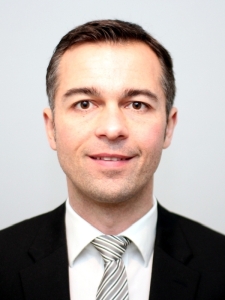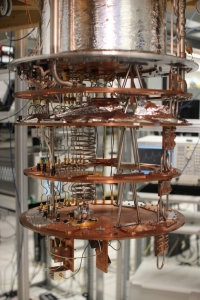The “QuantumMagnonics” project of Dr. Martin Weides of the Physikalisches Institut of KIT deals with dynamic processes inside ferromagnets, such as iron or cobalt. Results of his fundamental research might be used for magnetic data processing components. The Research Council of the European Union funds the project with EUR 2 million.
“We are interested in the behavior of ferromagnets in the quantum regime,” the physicist says. To explore physical processes in the atomic range, the researcher studies layers of thin material films structured in the nanometer range. These films are produced by KIT’s DFG Center for Functional Nanostructures. With the help of experiments complementing and extending conventional measurement methods of classical physics, Weides hopes to better understand damping – loss – of energy while passing the magnetized material. Work focuses on intrinsic rotations of the individual electrons, called spins. The project is aimed at generating a single spin wave excited by an electromagnetic impulse. To measure the dynamic processes of the excited state, quantum bits, briefly called qubits, are to be applied as detectors and information units. The long project title is “QuantumMagnonics – Coupling of Spin Waves with Superconducting Quantum Circuits for the Generation and Detection of Individual Spin Waves.” This fundamental research is expected to produce findings that will be of relevance to the use of magnetic materials in data processing, e.g. for storage media or logics elements.

For his research to understand the dynamics
in ferromagnets, Dr. Martin Weides receives
an ERC Consolidator Grant of the EU. (Photo: private)
One third of the funds of EUR 2 million granted by the European Union for five years will be spent by Weides for purchasing measurement instruments. Two thirds of the funds will be used to cover personnel costs for doctoral students and post-docs involved in the project. For his experimental studies, the physicist among others applies dilution refrigerators that reach extremely low temperatures near absolute zero of minus 273°C.
With ERC Consolidator Grants, the European Research Council (ERC) support projects of excellent scientists, who were conferred the doctorate seven to twelve years ago. The ERC was established in 2007 as an institution to fund fundamental pioneer research in Europe. “Thanks to funding under the EU program, we will be able to catch up with Japan and the USA that play a major role in this research area,” Weides says. The project at KIT’s Physikalisches Institut is based on the long-term research of the physicist, who has been working as a research assistant in the research group of Professor Alexey Ustinov since 2012. Before, the expert for solid-state physics and superconductors worked at Forschungszentrum Jülich and the University of California, Santa Barbara, among others.
Weides has acquired the meanwhile seventh ERC Grant for the KIT. Before, renowned ERC funds were granted to Dr. Regina Hoffmann, Physikalisches Institut, in 2009, Dr. Matthias Schneider, Institute of Meteorology and Climate Research, in 2010, Professor Holger Puchta of the Botanical Institute, Professor Christian Koos of the Institute of Photonics and Quantum Electronics, and Dr. Alexander Nesterov-Müller of the Institute of Microstructure Technology in 2011, as well as to Erin Koos of the Institute of Mechanical Process Engineering and Pavel Levkin of the Institute of Toxicology and Genetics in 2013.
In close partnership with society, KIT develops solutions for urgent challenges – from climate change, energy transition and sustainable use of natural resources to artificial intelligence, sovereignty and an aging population. As The University in the Helmholtz Association, KIT unites scientific excellence from insight to application-driven research under one roof – and is thus in a unique position to drive this transformation. As a University of Excellence, KIT offers its more than 10,000 employees and 22,800 students outstanding opportunities to shape a sustainable and resilient future. KIT – Science for Impact.

